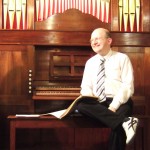The Sussex Concert Orchestra has become a regular visitor to Hastings Week and brought the annual celebrations to a fitting and exciting climax at St Mary in the Castle last night. Opening with Tchaikovsky’s 1812 Overture was something of a gamble as it is frequently used as a climax. In this case the panache needed to carry it off was not lacking, even if some of the attack was not as precise as might be expected. The percussion section was certainly enjoying itself at the end.
Jessica Zhu won the Hastings Piano Competition in 2011 and returned to perform Schumann’s Piano Concerto. The originally planned Prokofiev would have been more interesting for both orchestra and audience, though maintaining a wholly romantic programme did make sense. Her approach to the Schumann was remarkably dry and unemotional, not that it lacked commitment but that the sentimentality of some of the scoring was never in evidence. The rich orchestral accompaniment was well developed without ever overwhelming the soloist. The Andantino grazioso was particularly effective with its gentle mood changes.
After the interval we heard Dvorak’s Eighth Symphony, which brought us some fine solo playing from the lead flute and trumpet, and a beautifully flowing cello line at the opening of the final movement. The brass section was rightly raucous in the finale, bringing the evening to a fine close. Throughout, Kenneth Robert had steered his forces with aplomb. It is not easy, even with professional musicians, to produce finely rounded performances within very limited rehearsal times, and it is a tribute to all concerned that professionalism shines through with these musicians.
St Mary in the Castle is a small venue where orchestral music is concerned but its fine acoustic blends and softens sound without blurring details. That it might be lost to us would be a tragedy, and occasional outings like this only serve to remind us how short-sighted any closure would be. BH








